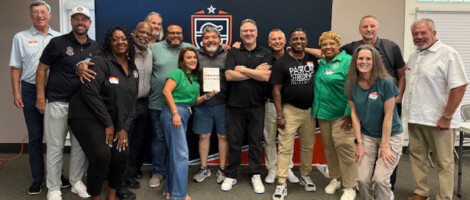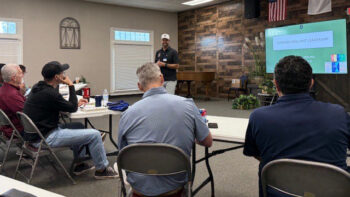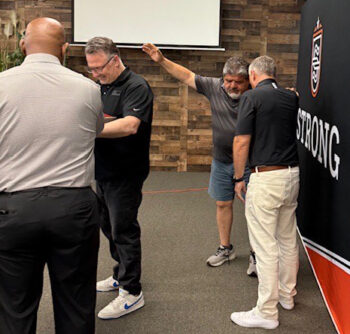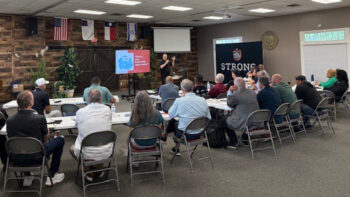Coppell pastor gains sovereign perspective, learns resilience in leadership in Pastor Strong cohort
by Jessica King on July 7, 2025 in Stories of Impact

Cohort pastors and Texas Baptists staff posed with Tod Bolsinger after his session on how to become a tempered, resilient leader during the June meeting of the San Antonio cohort.
"It's really encouraging to be around other people who love Jesus and are trying their best to serve the church humbly and faithfully in their own context,” said John Hewlett, pastor of Valley Ranch Baptist Church (VRBC).
Hewlett has been on staff at VRBC since 2001, but moved into the senior pastor role last summer. He said he’s always known the importance of “hav[ing] strong relationships with other pastors from other churches,” but since stepping up as senior pastor, “I'm even more acutely aware of it now.”
“[It’s a need] for so many reasons; I think the main thing is for spiritual encouragement and emotional encouragement and friendship and community, but then also to learn from each other and to ‘spur one another on toward love and good deeds,’ like Hebrews [10:24] says,” said Hewlett.
Ryan Jespersen, Dallas Baptist Association executive director, told Hewlett about Pastor Strong and “sent me an invitation” to the Dallas cohort launch. Steve Massey, vice president of the Texas Baptist Missions Foundation, also recommended he check it out.
Hewlett is one of 75 pastors participating in four Pastor Strong cohorts that launched around the state in April. The cohorts will meet monthly until August, when they will embark on a combined retreat in Buena Vista, Colorado.

Director of Pastoral Health Networks Kevin Abbott introduces June Cohort meeting topic: Tempered Resilient Leadership.
Pastor Strong Cohorts were developed by Area 5 Representative and Director of Pastoral Health Networks Kevin Abbott when he was on staff at the Union Baptist Association (UBA) in Houston. Originally named “Resilient,” Pastor Strong cohorts were a part of a doctoral project at Fuller Seminary in 2019. After its development, Abbott was “blessed to be able to lead about four different Resilient cohorts over a three-year period with about 100 pastors.”
While “in the incubator” at UBA, Abbott and his team found an adult learning style that would be most effective for the pastors in the cohorts.
“We believe there's information they need [but] information alone is not going to transform. We know that from preaching,” explained Abbott. “I remind [cohort pastors] that ‘Hey, by the way, do you know how much percentage of your sermons every week that people remember when they leave church? [It’s] very sobering, only 10 to 12%.’ So what that tells you is that preaching is a great catalyst, a great vision, a great motivator, but it doesn't go much beyond in the sense of transforming their lives during the week, usually.”
Abbott found that adults learn best when information is processed in “a communal environment, i.e. cohort.”
Finishing well with your rowboat
Abbott kicked off each Pastor Strong Cohort launch by explaining “the DNA” of the cohorts. He told pastors, “we’re a rowboat in a cohort.”
“We show a picture of a rowboat, with a bunch of rowers and a coxswain at the front cheering them on and encouraging them, keeping them steered, [and I] said, ‘We're a rowboat in a cohort. We're taking information and we're processing [it] in a safe community,’” said Abbott.
The pastors are also encouraged that “community builds courage when you are accountable with others.”
“I tell them, ‘You can't get to clarity alone. This is a place to help you get clarity with each other.’ I tell them, ‘Transformation comes and change comes in community,’” said Abbott. “I tell them that the knowledge is in the room. The resources are in the room. It's not me or any other facilitator that's bringing all the information. The value is the 20 or 25 or 15 or [however many] kingdom leaders that are around those tables in the rowboat.”
Prior to each cohort meeting, pastors are expected to read a book that aligns with the meeting's subject. For this launch session, the cohorts spent the morning focused on “the concept of finishing well.” Drawing from “The Making of a Leader” by J. Robert Clinton, pastors discussed the barriers that might keep them from finishing ministry well and answered the question: “What are those habits that you need to finish life and ministry?”
Sticky note timeline gives “sovereign perspective”
During the afternoon session of the cohort, pastors discussed lifelong leader development theory and how God shapes them over a lifetime as leaders.
“We talked about how our journey goes through different transitions of leadership and development, and how it takes us to other levels and retools us. What does that look like for them? Where are they at on this journey? How is God using the people, events and circumstances to shape them?” said Abbott.
The pastors ended the day with an activity inspired by one of the healthy habits of finishing well: “leaders that finish well have a sovereign perspective of their lives.”
“We do this tool called the sticky note timeline… that helps them see their lives mapped out by the time it's done of how God has shaped them uniquely through people, events, circumstances since the day they were born,” explained Abbott.
Hewlett said creating his sticky note timeline was the most impactful part of the day.
“The way that Kevin led us through that activity really helped you kind of take a 30,000ft view of your life and then be able to see, ‘Okay, what are the ways that God has been working? What are some of the more challenging areas? What are some of the areas that have been a big blessing, and what some of the trends are and themes are,” said Hewlett.
Between mapping out each chapter of their lives, pastors were paired up with one another or with cohort leaders to have “battle buddy discussions” to process each step. Abbott said this part of the activity is “where you just see the room light up.”

Pastor Strong Cohort “battle buddies” paired up to discuss and pray through material throughout the June meeting of the San Antonio cohort.
Hewlett was paired with Bennye Bryant, director of Women in Ministry Network at Texas Baptists, as his “battle buddy” for the afternoon. He said he was encouraged by Bryant’s story and the “unexpected ministry season” she is in, and how God has used her.
Bryant said reflecting on her life emphasized “how God uses both the good and the bad to guide us closer to him.” She said this realization was particularly encouraging to her role at Texas Baptists.
“This 'aha!’ moment encouraged me in my role as director of the Women In Ministry Network, making it clear that God prepares us throughout our lives for the tasks he has in store for us in kingdom building. This thought increased my confidence, as I embrace the opportunities ahead,” said Bryant.
Hewlett said the sticky note timeline “prompted some really good thinking” about “different people who've been impactful in my life.”
“I took a couple of pictures of some of the sticky notes, and texted friends whose names were on the sticky notes and told them what I was doing and was able to say how grateful I was for their impact in my life,” said Hewlett.
He said slowing down to “take that broad view” of his life prompted “a helpful discipline to force me to stop” and “think big picture.”
“I probably wouldn't have forced myself to be that reflective [on my own]. I probably would have been working on my task list if I wasn't there,” said Hewlett. “There's always stuff to do, always sermons to write, always people to meet with, always meetings to be led. And I have to force myself to step back and kind of look out the window… when you're leading people, you have to have time to be able to kind of zoom out.”
Hewlett said the activity lived up to its intended purpose, to help him gain perspective.
“But as much as anything, it’s remembering that the sermon I’m writing this week doesn’t stand on its own – it’s part of a bigger story that God is writing. Taking this time to zoom out and see the big picture has been really encouraging and helped me have perspective on what I’m doing,” said Hewlett.
Abbott said the April cohort launches were intentional in “getting the ball rolling on [pastors] getting clarity on what God is doing to shape them, clarity of their kingdom purpose, so that they can live into it and then lead others to live into it.”
Enneagram helps articulate leadership styles
In between each monthly meeting, pastors are offered coaching sessions with a trained coach to help them “discover the answers to whatever they're processing and come up with an action step.”
In May, the cohorts met for the second time to go through the Enneagram process, “which is understanding who they really are [and] understanding how they lead.” Abbott said the Enneagram is “more than just a typical personality test” and the reason Pastor Strong cohorts “lean into it is because of the spiritual formation aspect.”
After their first meeting in April, the pastors received a link to take an Enneagram assessment and came to their May meeting ready to learn about “the different types and how they relate to one another” from a “trained Enneagram expert.”
After the session, pastors received their Enneagram results and “a 40-page report” that gives them “more information about them than they ever knew.” They were offered individual coaching sessions over the next month to understand their Enneagram type.
Hewlett said examining his Enneagram results could help him “short-circuit my more fleshly responses.”
“The [Enneagram type] one has more tendencies toward trying to make sure everything is right, and you can sometimes ignore the people around you or step on the people around you just to get to the right answer,” explained Hewlett. “I know that about myself already, but the articulation of it there was really helpful.”
Hewlett said he is looking forward to his Enneagram coaching session. He said his goal between the May and June sessions would be to consider “2 or 3 things that I really want to try to be aware of over this next month.”
“[One thing] I'll take with me from that [session] is trying to be more attuned to what's happening in my own mind and heart, so that I can be more aware of it, so I can be more intentional on how I love people,” said Hewlett.
Being a resilient leader through ministry transition
In the next session, pastors heard about leading through change from Tod Bolsinger, co-founder of AE Sloan Leadership and author on Christian leadership. In the morning session, he taught from his book “Canoeing the Mountains: Christian Leadership in Uncharted Territory,” and discussed leading organizational change. In the afternoon, he taught from his book “Tempered Resilience: How Leaders are Formed in the Crucible of Change,” which the pastors read beforehand, and discussed how to become a tempered, resilient leader who can lead an organization through change.

Pastor Strong Cohorts learned from Tod Bolsinger, co-founder of AE Sloan Leadership and author on Christian leadership, at the June meeting of the San Antonio cohort.
Hewlett said this session was the one he was “looking forward to the most out of all of them.”
“I was really impacted by ‘Canoeing the Mountains,’ and when I heard him speak before. [He’s] just really gifted and talented, and so to be able to be in that small setting of just 30 or 40 of us and him and really work through that, I'm excited about that,” said Hewlett. “All of us, myself included, can definitely learn how to be more resilient in the face of challenging personal dynamics.”
Throughout the cohorts, Abbott has been praying that “God would give clarity to these leaders that are in a fog.”
“Even though these are leaders of leaders, there's still some of them at the tables… that are in a transition, a major transition in their ministry of going to another level of leadership and just another level of God shaping them and then preparing them for their next phase of ministry,” said Abbott.
Abbott said there may also be pastors going through the cohorts who “don't realize, maybe, that they're in a transition.”
“In April, I think many of them, I could see the light bulb going on or the spirit of God was like hitting them, and they were saying, ‘Okay, I know there's something going on. God's doing something in my heart. I need to get clarity on what that shaping is that he's doing in my heart and life.’ So helping them see that is a prayer of mine,” said Abbott.
Abbott said he is also praying that he would “be sensitive along that process and our leaders along that process to help guide them in that.”
“I want them to see… you are a work in progress, too. You haven't arrived and you'll never fully arrive till the day you get your glorified body,” said Abbott. “We're all in a learning process and growing, so I want to see the humility and the brokenness that starts here really exude over into the lives of these leaders so that they lead out of that place of the soul.”
To learn more about Pastor Strong Cohorts and how they can be a resource for you, visit txb.org/ministries/pastor-strong-cohorts.
Strengthening a multiplying movement of churches to live out the Great Commandment and Great Commission in Texas and beyond.
The ministry of Texas Baptists is made possible by giving through the Texas Baptists Cooperative Program, Mary Hill Davis Offering® for Texas Missions, Texas Baptists Worldwide and Texas Baptist Missions Foundation. Thank you for your faithful and generous support.
Subscribe to receive stories like this one directly to your inbox.
We are more together.
Read more articles in: Stories of Impact, Ministerial Health
More from Jessica King
- Millennial/Gen Z Network is "revolutionary," provides resources, community, refreshment for young ministry leaders
- Children’s Worship University trains leaders to “raise disciples in the area of worship”
- Corpus Christi church plant hosts annual retreat, meets medical needs for Ghanaian children with disabilities
- 98 BSM and church collegiate leaders form 2026 State Lead Team, develop skills to “change the culture” of ministry
- Behind The Chutes Cowboy Church shares resources, plants seeds of the gospel at Amarillo Fair & Rodeo